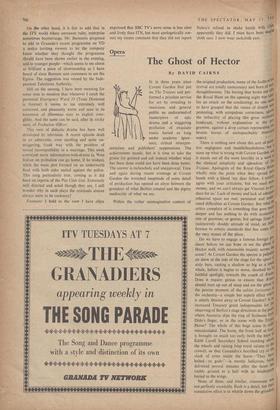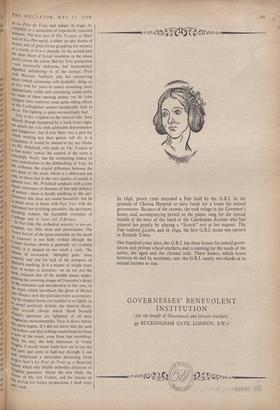Opera
The Ghost of Hector
By DAVID CAIRNS Within the rather unimaginative context of the original production, many of the faults of this revival are totally unnecessary and born of MI thoughtlessness. The booing' that broke out afica the Royal Hunt on the opening night was O'es for an attack on the conducting; no one see° to have grasped that the voices of dissent protesting, with scrupulous correctness, again); the imbecility of playing this great orchestra landscape, without explanation in the Prc; gramme, against a drop curtain representing t°1 bronze horses of unimpeachably municiP3 aspect. There is nothing new about this sort of Prit/i.i; tive negligence and muddleheadedness. but id sums up what is wrong with Covent Garden, Of it stands out all the more horribly in a work: • the classical simplicity and splendour of Trojans. Apologists of the Royal Opera HuL15.e, wholly miss the point when they spread ther: hands with a bland 'my dear fellow, entird agree with your criticisms, but we need Ore money, and we can't always get Visconti to Pra. duce for us.' Lack of money and lack of adequate rehearsal space are real, persistent and tlude„,r. rated difficulties at Covent Garden. But what tE; critics complain of is something that goes 00 deeper and has nothing to do with econonlics' size of premises, or genius, but springs from ;a instinctively shoddy attitude of mind, an indr ference to artistic standards that has eaten the very stones of the place. Do we have to engage a famous foreign Pf(r, ducer before we can hope to• see the ghost Hector stalk with reasonable majesty across the scene? At Covent Garden the spectre is palpablYf on show at the side of the stage for the space sixty bars, casting a shadow as big as a 00 whale, before it begins to move, sleuthed bY ils faithful spotlight, towards the couch of kne35; Does it require genius to ensure that /Ene3; should start up out of sleep and see the ghost 3 the precise moment of the subito fortissimo ill° the orchestra—a simple but superb effect whic is utterly thrown away at Covent Garden? Is an increased Treasury grant indispensable for th6t observing of Berlioz's stage directions at the P°in where Ascanius slips the ring of Sychaeus fOrn Dido's finger, or in the scene with the Trujaie Horse? The whole of this huge scene is 0°, miscalculated. The horse, the front half at icus'i is brought on much too early (with the boYs ° Edith Cavell Secondary School standing ab°, the wheels and raising limp royal salutes to tb` crowd); so that Cassandra's horrified cry at tbe clash of arms inside the horse—They hay: halted—ye godsr—is merely ludicrous, beiI4' delivered several minutes after the beast Os visibly ground to a halt with its hinderparts buried in the wings. None of these, and similar, crassnesses Was not perfectly avoidable. Each is a detail, but their., cumulative effect is to whittle down the.grandeul THE SPECTATOR. MAY 13, 1960 of .La Prise de Troie and reduce its tragic in- evitability to a succession of imperfectly executed tableaux. The first part of The Trojans, as Shaw Said of Ds Rhein gold, is either an epic drama of destiny and of great forces grappling for mastery or a world, or it is a charade. In the second part the sheer flood of lyrical invention in the music Partly carries the action. But for Troy production not necessarily elaborate, but monumental, dIgnified, unfaltering—is of the essence. Even with Mariano Andreu's safe but uninspiring (.1.!cor (which economics will probably oblige us to live with for years to conic) something more 12Propriately noble and convincing could surely be made of these opening scenes; yet Sir John lelgud (who contrives some quite telling effects 111 the Carthaginian scenes) inexplicably fails to do so The lighting is quite excruciatingly bad. Troy is also crippled on the musical side. Amy Shuard, though hampered by a weak lower regis- ter, assails her role with admirable determination a id lungpower; but if ever there was a part for -tch nothing less than genius will do, it is Cassandra. It would be absurd to lay any blame on Mr. Pritchard, who took on The Trojans at a few weeks' notice; his control of the score is a .. -nazi ngl y fluent; but his conducting makes its °4'n contribution to the diminishing of Troy. In the orchestra the crucial difference between the tw° Parts of the work, which is a difference not only in idiom but in the very quality of sound, is ossed over. Mr. Pritchard conducts with a con- tinual awareness of fineness of line and delicacy texture—there is hardly anything in this per- f4inance that does not sound beautiful—but he is much more at home with Part Two, with the restrained but ravishing sensuality, the persistent, -~nt.ng sadness, the incredible sweetness of Carthage and le beau del d'Afrique. lin Part One the orchestral sonority is too un- troubled, too little deep and doom-laden. The °zen horror of the great ensemble on the death Of Laocoon is not fully evoked (though the Covent Garden chorus is generally on excellent tlirni); it is shaped on too small a scale. The chorus of invocation, 'Almighty gods,' loses /laIsteritY and size for lack of the pomposo of !rhoz's marking. It is a matter of weight more than of tempo or dynamic: we do not feel the d Irk, insistent line of the double basses under- pinning the towering images of Cassandra's dread in the recitative and introduction to her aria; in the music which introduces the ghost of Hector int
Lo /Eneas's tent the pizzicato notes accompany- in
tog tae stopped horns are touched in so lightly as is sound positively skittish; the massive dimin- led seventh chords which throb beneath l%
/E
-eas's questions are lightened of all their Wagnerian monumentality. Troy is down before the opera begins. If I did not know that the oath Is hollow and that nothing would keep me from a n bcote of the music, even from that stumbling- (to me), the holy holocaust of Vestal or ins, I would swear from now on to cut the . — Part and come in half-way through. I can W 6.4l. understand a newcomer- dismissing (God fagIve him!) La Prise de Troie as a theatrical v l'iure which only fitfully embodies delusions of rgilian grandeur. About the new Dido, the /tn :'eas of Mr. Jon Vickers, and the lessons of this revival for future productions, I shall write 1:1eXt week.





































 Previous page
Previous page